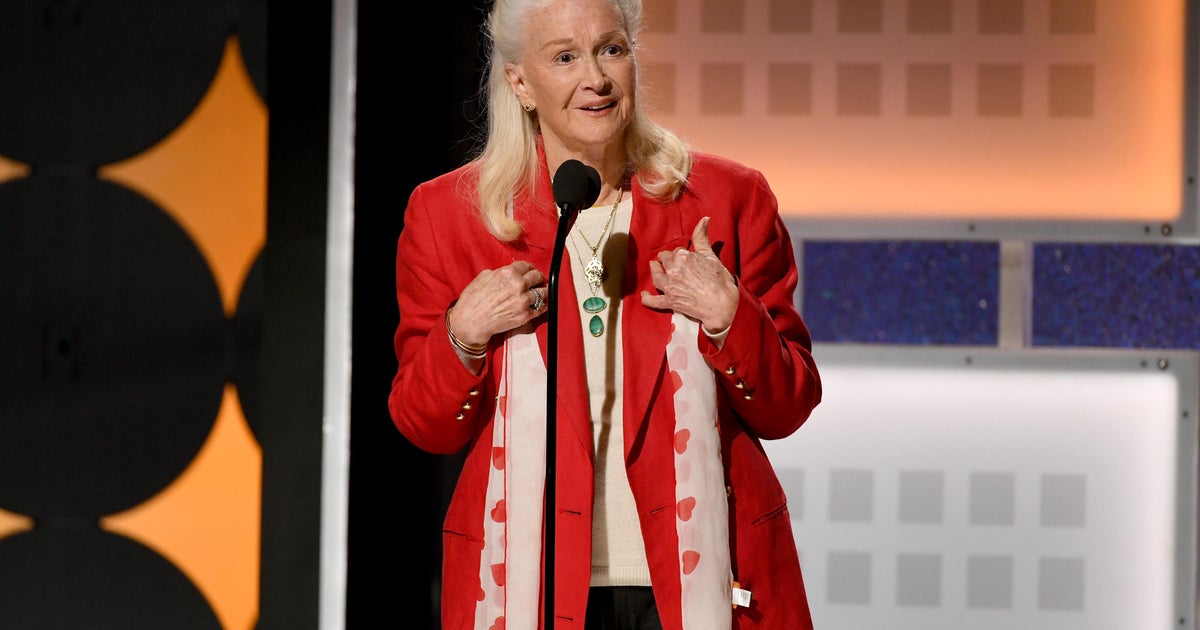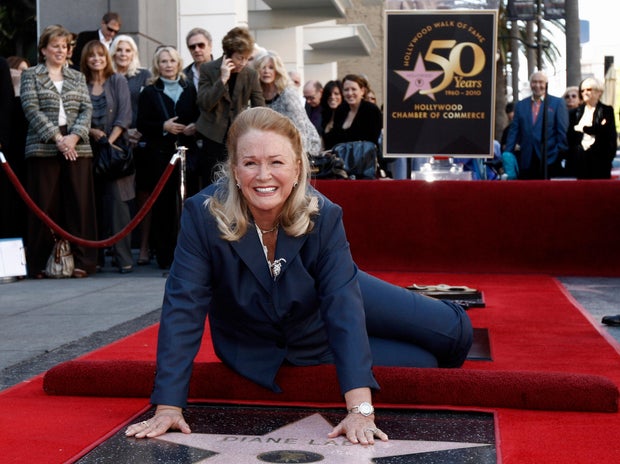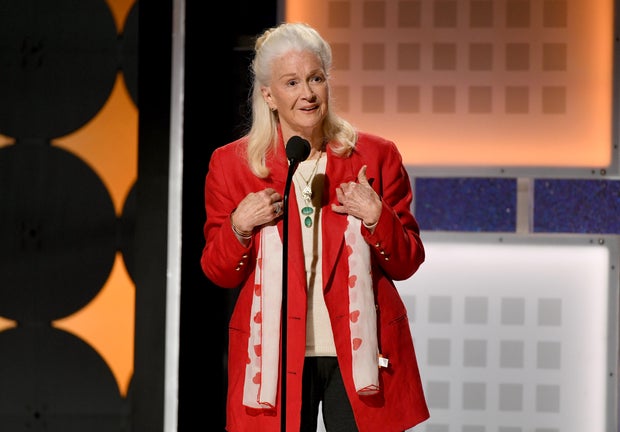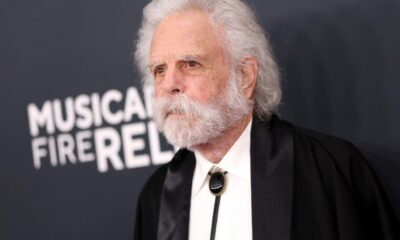Entertainment
Diane Ladd, Oscar-nominated actress and mother of Laura Dern, dies at 89

Diane Ladd, the actress known for her Oscar-nominated roles in “Alice Doesn’t Live Here Anymore,” “Wild at Heart” and “Rambling Rose,” has died, her representative confirmed to CBS News on Monday. She was 89.
Her daughter, Laura Dern, said in a statement that she was by Ladd’s side when she passed at her home in Ojai, California.
“She was the greatest daughter, mother, grandmother, actress, artist and empathetic spirit that only dreams could have seemingly created,” Dern said. “We were blessed to have her. She is flying with her angels now.”
Dern’s statement didn’t immediately cite a cause of death.
In 2023, the mother and daughter told “CBS Sunday Morning” that the two began taking daily walks in Santa Monica after learning that Ladd had developed a lung disease, believed to be caused by exposure to pesticides. Dern was told her mother only had six months to live.
Slaven Vlasic / Getty Images
That’s when the two had conversations that eventually filled the pages of “Honey, Baby, Mine,” their joint memoir named for an old folk song Ladd’s father used to sing. They discussed everything, starting with Ladd’s marriage and divorce from Laura’s father, actor Bruce Dern, to her efforts to discourage Laura from joining the family business.
“She was only, like, 11 years old, and I said, ‘Don’t be an actress. Be a doctor, be a lawyer,'” Ladd said. “Nobody cares if you put on weight or your chin points when you cry if you’re a doctor. They just want you to be the best you can be. But an actress? They care, care, care, care, care.”
But Dern said there was no stopping her from being in movies: “No. It is all I knew.”
Matt Sayles / AP
A native of Laurel, Mississippi, Ladd was apparently destined to stand out. In her 2006 memoir, “Spiraling Through the School of Life,” she remembered being told by her great-grandmother that she would one day be in “front of a screen” and would “command” her own audiences.
By the mid-1970s, she had lived out her fate well enough to tell The New York Times that she no longer denied herself the right to call herself great.
“Now I don’t say that,” she said. “I can do Shakespeare, Ibsen, English accents, Irish accents, no accent, stand on my head, tap dance, sing, look 17 or look 70.”
A gifted comic and dramatic performer, Ladd had a long career in television and on stage before breaking through as a film performer in Martin Scorsese’s 1974 release “Alice Doesn’t Live Here Anymore.” She earned an Oscar nomination for supporting actor for her turn as the acerbic, straight-talking Flo, and went on to appear in dozens of movies over the following decades.
Kevin Winter / Getty Images
Her many credits included “Chinatown,” “Primary Colors” and two other movies for which she received best supporting nods, “Wild at Heart” and “Rambling Rose,” both of which co-starred her daughter. She also continued to work in television, with appearances in “ER,” “Touched by an Angel” and “Alice,” the spinoff from “Alice Doesn’t Live Here Anymore,” among others.
Through marriage and blood relations, Ladd was tied to the arts. Tennessee Williams was a second cousin, and first husband Bruce Dern, Laura’s father, was himself an Academy Award nominee. Ladd and Laura Dern achieved the rare feat of mother-and-daughter nominees for their work in “Rambling Rose.”
Entertainment
Elon Musk fuses SpaceX and xAI in $1tn mega deal

Elon Musk said on Monday that SpaceX has acquired his artificial-intelligence start-up xAI in a record-setting deal that unifies Musk’s AI and space ambitions by combining the rocket-and-satellite company with the maker of the Grok chatbot.
The deal, first reported by Reuters last week, represents one of the most ambitious tie-ups in the technology sector yet, combining a space-and-defence contractor with a fast-growing AI developer whose costs are largely driven by chips, data centres and energy. It could also bolster SpaceX’s data-centre ambitions as Musk competes with rivals like Alphabet’s Google, Meta, Amazon-backed Anthropic and OpenAI in the AI sector.
The transaction values SpaceX at $1 trillion, and xAI at $250 billion, according to a person familiar with the matter.
“This marks not just the next chapter, but the next book in SpaceX and xAI’s mission: scaling to make a sentient sun to understand the Universe and extend the light of consciousness to the stars!” Musk said.
The purchase of xAI sets a new record for the world’s largest M&A deal, a distinction held for more than 25 years when Vodafone bought Germany’s Mannesmann in a hostile takeover valued at $203 billion in 2000, according to data compiled by LSEG.
The combined company of SpaceX and xAI is expected to price shares at about $527 each, another person familiar with the matter said. SpaceX was already the world’s most valuable privately held company, last valued at $800 billion in a recent insider share sale. xAI was last valued at $230 billion in November, according to the Wall Street Journal.
The merger comes as the space company plans a blockbuster public offering this year that could value it at over $1.5 trillion, two people familiar with the matter said.
SpaceX, xAI and Musk did not immediately respond to requests for comment.
The deal further consolidates Musk’s far-flung business empire and fortunes into a tighter, mutually reinforcing ecosystem – what some investors and analysts informally call the “Muskonomy” – which already includes Tesla, brain-chip maker Neuralink and tunnel firm the Boring Company.
The world’s richest man has a history of merging his ventures. Musk folded social media platform X into xAI through a share swap last year, giving the AI start-up access to the platform’s data and distribution. In 2016, he used Tesla’s stock to buy his solar-energy company SolarCity.
The agreement could draw scrutiny from regulators and investors over governance, valuation and conflicts of interest given Musk’s overlapping leadership roles across multiple firms, as well as the potential movement of engineers, proprietary technology and contracts between entities.
SpaceX also holds billions of dollars in federal contracts with NASA, the Department of Defense and intelligence agencies, which all have some authority to review M&A transactions for national security and other risks.
Entertainment
‘Had to really take it serious’

Jelly Roll opened up about his dramatic weight loss at the 2026 Grammy Awards, explaining that the transformation came only after he decided to take his health as seriously as his past battles with addiction.
Speaking to reporters in the Grammys press room on 1 February, the singer revealed he has lost more than 200 pounds and said the journey required a complete shift in mindset.
“I did it with a lot of consistent cardio and food,” he said.
“I had to fight my food addiction just the way I fought my cocaine addiction. I had to really take it serious. I had to change my relationship with food.”
The 41-year-old, whose real name is Jason Bradley DeFord, stressed that weight loss for him was as much mental as it was physical. He shared that therapy played a key role in helping him manage cravings and break unhealthy patterns.
“I had to do a lot of mental therapy and a lot of mental work about it to block the food noise,” he explained, adding that he never used weight-loss injections. “Never did a GLP-1, but I don’t judge nobody who does it.”
Jelly Roll, who took home three awards at the 68th annual Grammys, including Best Contemporary Country Album, Best Country Duo/Group Performance with Shaboozey, and Best Contemporary Christian Music Performance/Song, used the moment to encourage others facing similar struggles.
“Anybody who’s 500 pounds: I don’t care if you take one shot or 10,” he emphasised.
“Do whatever it takes. Get the weight off. Don’t listen to nobody else. Go get your life straight and save that heart.”
He has previously shared that earlier attempts to lose weight had failed, and it was his sobriety journey that ultimately changed his approach.
Reflecting on the process during a December appearance on The Joe Rogan Experience, he said he decided to slow down and be more intentional.
“When I sat down to try to lose it this time, I said, ‘I’m going to take a different approach. I’m going to really take my time with it and I’m going to think about what I’m doing and be intentional,’” he recalled, noting that his experience with addiction helped him recognise deeper patterns.
“I’ve dealt with drug addiction, so I was like, maybe there’s something here.”
Exercise, particularly running, has become central to his daily routine.
He recently told E! News that food was the biggest change he made, but movement became his anchor.
“Running’s been my real healer,” he said, explaining that he runs every single day. Even on lighter days, he makes sure to get in at least a mile at a slow, steady pace.
Beyond the physical changes, Jelly Roll says his motivation is rooted in family.
He is a father to Bailee Ann, 17, and Noah, 9, from previous relationships, and credits his wife, Bunnie XO, with being his strongest support system.
“Bunnie played the [biggest] role to even get me here,” he said. “Every part of me that gets better is just another attempt to be a better husband and a better father.”
While he is proud of the weight he has lost, Jelly Roll made it clear the journey is ongoing.
For him, the transformation is not about a finish line, but about continuing to grow. As he put it, losing weight was only one step, and he knows he has to keep evolving tomorrow.
Entertainment
Halle Berry reveals major plans for 2026

Halle Berry says she’s entering a new phase of her life, and she has no intention of being quiet about it.
The Oscar-winning actress, who turns 60 later this year, opened up about aging, visibility, and her plans for the future while posing for a striking new photoshoot with The Cut.
At 59, Berry said she’s embracing what she calls her “menopause mission” and is determined to speak up more than ever before.
“When you get older, you stop getting sized up like a pork chop,” Berry shared, explaining how the way women are viewed in Hollywood shifts with age.
She added that getting older can come with a sense of being pushed aside.
“You get to this age where you feel like you’re being marginalized, devalued. You feel it at work. You feel it from society … But I have adamantly decided I am not going to allow myself to be erased.”
That mindset is reflected not just in her words, but in her work.
According to the publication, Berry is preparing for a busy year ahead, set to produce three series and seven movies in 2026, while also starring in all of them.
The slate underscores her point that she isn’t slowing down, professionally or personally.
Berry also reflected on the personal work that helped her reach this stage of self-acceptance.
She credited attending a wellness retreat a few years ago with changing how she sees herself and her relationships.
“I realised I was just pulling in mirror images of myself, people who were broken, people with childhood wounds that weren’t addressed,” she said.
“I had to face the pain of what happened to me as a kid and release my secrets. I had to get it out of my body so I could fully love myself and show up for my own children.”
That self-love has been visible on her social media as well.
Berry marked her 59th birthday in August by sharing striking photos on Instagram, later revisiting the Bond-style imagery with another swimsuit post captioned, “This is 59.”
As she looks ahead to 2026, Berry is making it clear that age hasn’t diminished her voice, ambition, or presence.
If anything, she says, it’s given her the freedom to be louder, more visible, and more herself than ever before.
-

 Sports6 days ago
Sports6 days agoPSL 11: Local players’ category renewals unveiled ahead of auction
-

 Entertainment6 days ago
Entertainment6 days agoClaire Danes reveals how she reacted to pregnancy at 44
-

 Business7 days ago
Business7 days agoBanking services disrupted as bank employees go on nationwide strike demanding five-day work week
-

 Sports6 days ago
Sports6 days agoCollege football’s top 100 games of the 2025 season
-

 Fashion1 week ago
Fashion1 week agoSpain’s apparel imports up 7.10% in Jan-Oct as sourcing realigns
-

 Sports6 days ago
Sports6 days agoTammy Abraham joins Aston Villa 1 day after Besiktas transfer
-

 Politics6 days ago
Politics6 days agoTrump vows to ‘de-escalate’ after Minneapolis shootings
-

 Tech7 days ago
Tech7 days agoBrighten Your Darkest Time (of Year) With This Smart Home Upgrade




















